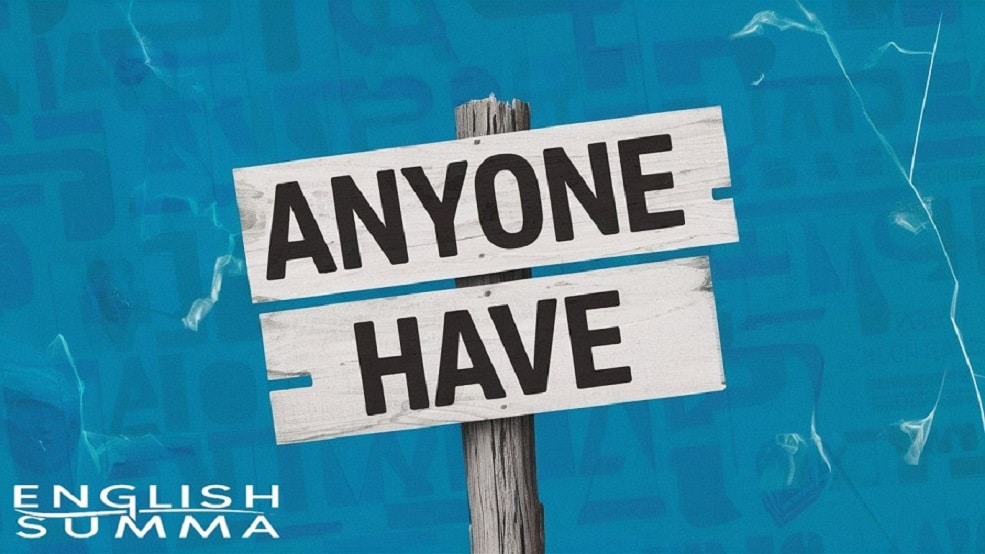Proper grammar usage is the cornerstone of effective communication. However, even the most seasoned language enthusiasts can find themselves stumbling over certain grammatical nuances. One such perplexing area is the usage of ‘anyone has’ or ‘anyone have.’ This common grammar quandary trips up native English speakers and learners alike, often leading to confusion and inconsistent application.
In this comprehensive guide, we’ll untangle the complexities surrounding this subject-verb agreement issue, equipping you with the knowledge and strategies to navigate it confidently. Whether you’re a student, a professional writer, or simply someone who values language proficiency, mastering this grammar nuance will enhance your communication skills and credibility.
The proper usage is “anyone has,” not “anyone have.” The word “anyone” is a singular indefinite pronoun, meaning it refers to an unspecified single person or entity. As a singular subject, it should take the singular verb form “has” according to the rules of subject-verb agreement in English grammar.
While there are some exceptions where “anyone” could take a plural verb like “have,” such as in certain conditional clauses or collective interpretations, the standard and most widely accepted usage pairs the singular “anyone” with the singular verb “has.” Deviating from this norm risks being perceived as ungrammatical or raising questions about one’s mastery of proper English.
The Underlying Rule: Singular Subjects and Subject-Verb Agreement
At the heart of the ‘anyone has’ versus ‘anyone have’ dilemma lies the principle of subject-verb agreement. In English grammar, singular subjects typically take singular verbs, while plural subjects require plural verbs. The word ‘anyone’ is a singular indefinite pronoun, meaning it refers to an unspecified person or group.
Here are some examples to illustrate the correct usage:
- Correct: Anyone has the potential to excel.
- Incorrect: Anyone have the potential to excel.
As you can see, the singular pronoun ‘anyone’ should be paired with the singular verb ‘has’ rather than the plural ‘have.’
Exceptions and Twists: When ‘Anyone’ Can Take a Plural Verb

While the general rule dictates that ‘anyone’ should take a singular verb, there are instances where it can legitimately be paired with a plural verb. These exceptions often arise due to contextual factors or specific interpretations.
Conditional Clauses and Collective Interpretations
In certain conditional clauses or when ‘anyone’ refers to a collective group, a plural verb may be appropriate. For example:
- “If anyone in the group have any questions, please raise your hand.”
Here, ‘anyone’ is interpreted collectively, referring to the members of the group as a whole. Thus, the plural verb ‘have’ is used.
American vs. British English Conventions
It’s worth noting that American and British English conventions sometimes diverge on this matter. While American English typically adheres to the singular subject-singular verb rule, British English can be more flexible, allowing plural verbs with ‘anyone’ in certain contexts.
Distributive vs. Collective Interpretations
The usage of ‘anyone has’ or ‘anyone have’ can also depend on whether the pronoun is interpreted distributively (referring to individuals separately) or collectively (referring to a group as a whole).
- Distributive: “If anyone has a question, they should raise their hand.” (Referring to individuals separately)
- Collective: “If anyone have any questions, they should raise their hands.” (Referring to the group collectively)
Tips for Determining Proper Usage
To ensure you’re using ‘anyone has’ or ‘anyone have’ correctly, follow these practical tips:
- Focus on Verb Proximity: Pay close attention to the verb’s position relative to the subject. Verbs must agree with the closest preceding subject.
- Check for Collective or Distributive Interpretation: Determine whether ‘anyone’ refers to individuals separately or a group collectively. This context will guide your verb choice.
- Rephrase for Clarity: If the meaning is ambiguous, consider rephrasing the sentence to avoid confusion. Clarity should always take precedence over strict adherence to rules.
Common Mistakes to Avoid

Even with a solid understanding of the underlying principles, certain pitfalls can lead to incorrect usage. Here are some common mistakes to watch out for:
- Plural Nouns as Red Herrings: Don’t let plural nouns like ‘rules’ or ‘regulations’ mislead you into using ‘anyone have.’ The verb should still agree with the singular subject ‘anyone.’
- Contractions and Possessives: Contractions like ‘anyone’s’ can sometimes sound plural, but they’re still singular and should be paired with ‘has.’
- Defaulting to ‘Have’: Avoid automatically defaulting to ‘have’ without checking subject-verb agreement. ‘Anyone has’ is often the correct choice.
Resources and Practice Opportunities
To solidify your understanding and reinforce proper usage, consider the following resources and practice opportunities:
- Usage Guides: Consult reputable grammar guides like The Chicago Manual of Style or The Gregg Reference Manual for authoritative guidance.
- Practice Exercises: Engage with interactive exercises and quizzes like those found on Grammar Book or Grammar Bytes to solidify your understanding.
- Online Quizzes and Games: Explore fun, gamified platforms like Grammar Galaxy or Englishclub to practice subject-verb agreement in an engaging way.
FAQs
Here are some frequently asked questions (FAQs):
Can ‘anyone’ ever be used with a plural noun?
While ‘anyone’ itself is a singular indefinite pronoun, it can sometimes be paired with a plural noun when the sentence structure or context demands it. For example:
- “Anyone with tickets need to show them at the entrance.”
In this case, ‘anyone’ is singular, but it’s referring to multiple individuals who collectively have tickets.
Is there a difference between ‘anyone’ and ‘anybody’ in terms of subject-verb agreement?
No, there is no difference between ‘anyone’ and ‘anybody’ when it comes to subject-verb agreement rules. Both are singular indefinite pronouns and follow the same guidelines for pairing with singular or plural verbs based on the context and interpretation.
Can ‘anyone’ be used in the plural form, like ‘anyones’?
No, ‘anyone’ does not have a plural form. It is an indefinite pronoun that refers to an unspecified person or group and is always treated as singular in terms of subject-verb agreement.
How does the usage of ‘anyone’ differ from other indefinite pronouns like ‘everyone’ or ‘someone’?
While ‘anyone,’ ‘everyone,’ and ‘someone’ are all indefinite pronouns, their usage can vary slightly. ‘Everyone’ is always plural and takes a plural verb (e.g., ‘Everyone have their own opinions’). ‘Someone,’ like ‘anyone,’ is singular and typically takes a singular verb unless the context suggests a collective interpretation.
Are there any regional or dialectal variations in the usage of ‘anyone has’ vs ‘anyone have’?
Yes, there can be some regional or dialectal variations in how strictly the subject-verb agreement rule is followed with ‘anyone.’ In certain dialects or informal speech, it’s not uncommon to hear ‘anyone have’ used, even when the singular verb ‘has’ would be technically correct according to standard English grammar rules.
Conclusion
Mastering the nuances of ‘anyone has’ versus ‘anyone have’ is a crucial step towards achieving language proficiency and effective communication. While this grammar conundrum may seem daunting at first, understanding the underlying principles, recognizing exceptions, and practicing diligently will empower you to navigate it with confidence.
Remember, subject-verb agreement is a fundamental pillar of clear and precise communication. Even native speakers can stumble over this nuance without conscious effort. By prioritizing proper grammar usage, you’ll not only enhance your credibility but also ensure your messages are conveyed with clarity and impact.
So, embrace the journey of continuous learning, practice regularly, and don’t be afraid to consult resources when needed. With dedication and persistence, you’ll soon master this grammar nuance and unlock the keys to truly polished and impactful communication.

